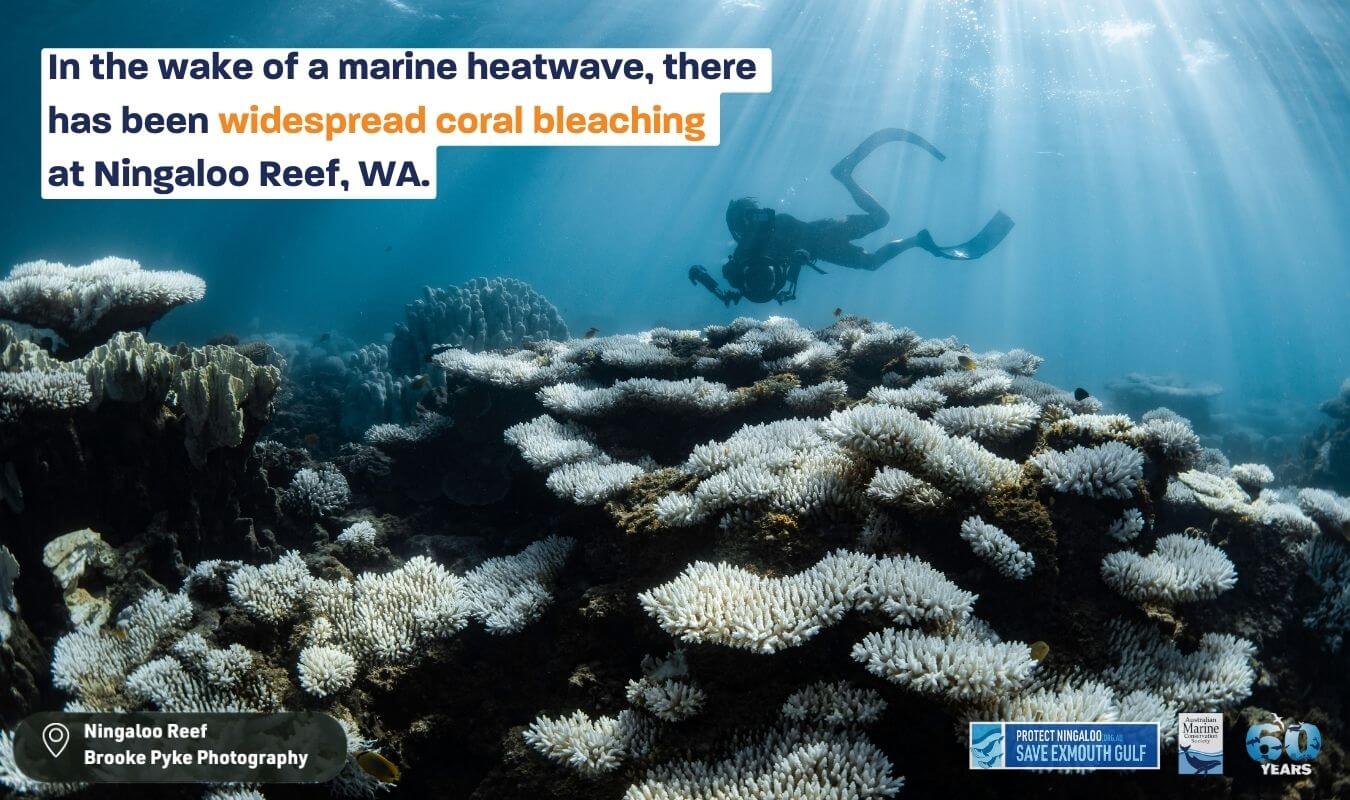Let’s create safe havens for our marine life, friend!
Marine heatwaves are periods of above average ocean temperature and impact marine wildlife, ecosystems and coral reefs, as well as life on land.
What’s been happening?
- February 2025: Ningaloo Reef suffers widespread coral bleaching from a vast underwater heatwave.
- January 2025: Marine heatwave kills 30,000 fish on WA coast.
- March 2024: Great Barrier Reef experiences catastrophic bleaching. Recurrent mass bleaching events since 2016 have had a severe impact on the Reef’s ability to recover.
- January 2024: The same marine heatwave forced an emergency evacuation of critically endangered red handfish from the wild.
- November 2023: A marine heatwave was linked to deaths in migrating birds and kelp loss.
- October 2023 and March 2024: The kelp forests in south-eastern Australia have been progressively lost, driven by changing ocean conditions caused by climate change.
In addition, marine heatwaves directly influence weather events such as cyclones and floods, like the Cyclone Alfred that so recently ravaged Queensland’s coast.
Like with bushfires on land, we can face these challenges in three ways:
- Responding to disasters
- Preparing for future challenges, and
- Making changes for a better tomorrow
AMCS is committed to fighting rising ocean temperatures, and that’s where you come in.
“How will my donation help?”
Oceans are heating due to climate change caused by the extraction and burning of fossil fuels. To cool down our oceans we need to ditch fossil fuels and continue moving responsibly to a renewable energy future.
And there are other actions governments can take to give our oceans a fighting chance against further heat stress. One of these is extending our national network of marine sanctuaries.
Marine sanctuaries act like national parks in the ocean, increasing the resilience and recovery of marine life.
Marine heatwaves have significant economic and cultural impacts because human activities are so intrinsically linked to the ocean.
Prolonged periods of unusually warm ocean can have severe repercussions on marine ecosystems and the fisheries sector, leading to:
- Loss of fish stocks resulting in losses of billions of dollars for our aquaculture sector and ocean fisheries
- Economic loss for our tourism industry – the Great Barrier Reef supports 64,000 jobs
- Damage or loss of significant cultural sites
- Impacts Aboriginal and Torres Strait Islander Peoples cultural activities and ability to care for sea Country
- Loss of iconic species that hold value to all Australians
- Loss of blue carbon ecosystems that store the carbon from fossil fuel emissions and cool our warming climate.
To be in the room and driving change we need your support – will you join the fight?
Please watch our short film Sanctuary exploring why Australia needs marine sanctuaries to safeguard our oceans:
Our efforts don’t end with marine sanctuaries, either. Other work we do at AMCS is also helping to fight marine heatwaves.
Sustainable Fisheries
To help ease the pressure our oceans are facing from marine heatwaves, we must support sustainable fisheries and choose responsible seafood. Well managed sustainable fisheries limits the harm to ocean habitats and wildlife.
Fight Climate Change
The best way to ensure our oceans’ future is to accelerate the global effort to cut emissions from burning coal, oil and gas. The Australian government can show their determination to meet this challenge if they commit to:
- 100% renewables by 2030,
- Commit to an emissions reduction target of 75% by 2030,
- Commit to Net Zero by 2035,
- Commit to immediately ending the public funding and subsidies of coal, oil and gas,
- Commit to no further approval of fossil fuel infrastructure; and no new thermal coal, oil or gas projects
All donations over $2 are 100% tax-deductible. Our important campaigns are not funded by Government grants, we are totally reliant on generous people like you to protect Australia’s oceans and the animals that call them home.
